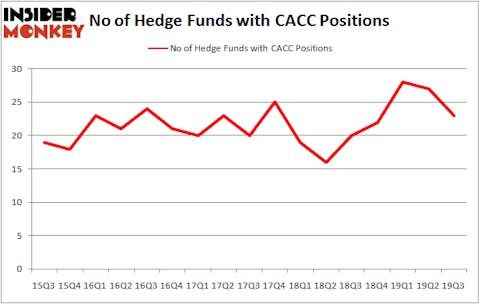Is Credit Acceptance Corp. (NASDAQ:CACC) a good bet right now? We like to analyze hedge fund sentiment before conducting days of in-depth research. We do so because hedge funds and other elite investors have numerous Ivy League graduates, expert network advisers, and supply chain tipsters working or consulting for them. There is not a shortage of news stories covering failed hedge fund investments and it is a fact that hedge funds’ picks don’t beat the market 100% of the time, but their consensus picks have historically done very well and have outperformed the market after adjusting for risk.
Credit Acceptance Corp. (NASDAQ:CACC) has seen a decrease in enthusiasm from smart money of late. Our calculations also showed that CACC isn’t among the 30 most popular stocks among hedge funds (click for Q3 rankings and see the video below for Q2 rankings).

Video: Click the image to watch our video about the top 5 most popular hedge fund stocks.
Hedge funds’ reputation as shrewd investors has been tarnished in the last decade as their hedged returns couldn’t keep up with the unhedged returns of the market indices. Our research has shown that hedge funds’ large-cap stock picks indeed failed to beat the market between 1999 and 2016. However, we were able to identify in advance a select group of hedge fund holdings that outperformed the Russell 2000 ETFs by 40 percentage points since May 2014 (see the details here). We were also able to identify in advance a select group of hedge fund holdings that’ll significantly underperform the market. We have been tracking and sharing the list of these stocks since February 2017 and they lost 27.8% through November 21, 2019. That’s why we believe hedge fund sentiment is an extremely useful indicator that investors should pay attention to.
Unlike the largest US hedge funds that are convinced Dow will soar past 40,000 or the world’s most bearish hedge fund that’s more convinced than ever that a crash is coming, our long-short investment strategy doesn’t rely on bull or bear markets to deliver double digit returns. We only rely on the best performing hedge funds‘ buy/sell signals. Let’s analyze the new hedge fund action encompassing Credit Acceptance Corp. (NASDAQ:CACC).
What does smart money think about Credit Acceptance Corp. (NASDAQ:CACC)?
At Q3’s end, a total of 23 of the hedge funds tracked by Insider Monkey held long positions in this stock, a change of -15% from one quarter earlier. By comparison, 20 hedge funds held shares or bullish call options in CACC a year ago. So, let’s find out which hedge funds were among the top holders of the stock and which hedge funds were making big moves.
Among these funds, BloombergSen held the most valuable stake in Credit Acceptance Corp. (NASDAQ:CACC), which was worth $234.3 million at the end of the third quarter. On the second spot was Abrams Bison Investments which amassed $163.8 million worth of shares. Gobi Capital, Cantillon Capital Management, and AQR Capital Management were also very fond of the stock, becoming one of the largest hedge fund holders of the company. In terms of the portfolio weights assigned to each position Billings Capital Management allocated the biggest weight to Credit Acceptance Corp. (NASDAQ:CACC), around 26.14% of its 13F portfolio. Gobi Capital is also relatively very bullish on the stock, setting aside 22.71 percent of its 13F equity portfolio to CACC.
Because Credit Acceptance Corp. (NASDAQ:CACC) has experienced declining sentiment from the entirety of the hedge funds we track, logic holds that there was a specific group of hedge funds that decided to sell off their positions entirely heading into Q4. Intriguingly, Clifford A. Sosin’s CAS Investment Partners dumped the biggest position of all the hedgies followed by Insider Monkey, totaling about $31.7 million in stock. Benjamin A. Smith’s fund, Laurion Capital Management, also sold off its stock, about $1.9 million worth. These moves are interesting, as total hedge fund interest fell by 4 funds heading into Q4.
Let’s now review hedge fund activity in other stocks – not necessarily in the same industry as Credit Acceptance Corp. (NASDAQ:CACC) but similarly valued. These stocks are LINE Corporation (NYSE:LN), Store Capital Corporation (NYSE:STOR), Snap-on Incorporated (NYSE:SNA), and Guidewire Software Inc (NYSE:GWRE). All of these stocks’ market caps match CACC’s market cap.
| Ticker | No of HFs with positions | Total Value of HF Positions (x1000) | Change in HF Position |
|---|---|---|---|
| LN | 7 | 105831 | -2 |
| STOR | 18 | 979106 | -4 |
| SNA | 24 | 487528 | -1 |
| GWRE | 22 | 836569 | 0 |
| Average | 17.75 | 602259 | -1.75 |
View table here if you experience formatting issues.
As you can see these stocks had an average of 17.75 hedge funds with bullish positions and the average amount invested in these stocks was $602 million. That figure was $1027 million in CACC’s case. Snap-on Incorporated (NYSE:SNA) is the most popular stock in this table. On the other hand LINE Corporation (NYSE:LN) is the least popular one with only 7 bullish hedge fund positions. Credit Acceptance Corp. (NASDAQ:CACC) is not the most popular stock in this group but hedge fund interest is still above average. This is a slightly positive signal but we’d rather spend our time researching stocks that hedge funds are piling on. Our calculations showed that top 20 most popular stocks among hedge funds returned 37.4% in 2019 through the end of November and outperformed the S&P 500 ETF (SPY) by 9.9 percentage points. Unfortunately CACC wasn’t nearly as popular as these 20 stocks and hedge funds that were betting on CACC were disappointed as the stock returned -6.7% during the fourth quarter (through the end of November) and underperformed the market. If you are interested in investing in large cap stocks with huge upside potential, you should check out the top 20 most popular stocks among hedge funds as many of these stocks already outperformed the market so far this year.
Disclosure: None. This article was originally published at Insider Monkey.



